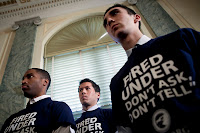A man's country is not a certain area of land, of mountains, rivers, and woods, but it is a principle and patriotism is loyalty to that principle.
George William Curtis
These fallen heroes represent the character of a nation who has a long history of patriotism and honor - and a nation who has fought many battles to keep our country free from threats of terror.
Michael N. Castle
Monday, May 26, 2014
Wednesday, January 08, 2014
How Not to Lead
How many toxic leaders have you been exposed to throughout your career?
I've experienced destructive leaders in both my military and civilian careers. It's a constant psychological battle when you encounter one on a daily basis and have to meet their insane and ever changing expectations. I first started reading about this topic after I worked under someone in the military who was borderline "toxic". And then I experienced another, and another. I most recently left a job where I worked for an individual who exemplified many of the traits of toxic leadership. They, and their habits, became easier to recognize over time. I'm happy to learn that the army is interested in this topic and is taking measures to stop this abusive form of leadership.
I highly recommend the book, "The Allure of Toxic Leaders" if you're struggling with this problem.
According to Army Doctrine Publication 6-22, "Toxic leadership is a combination of self-centered attitudes, motivations, and behaviors that have adverse effects on subordinates, the organization, and mission performance. This leader lacks concern for others and the climate of the organization, which leads to short- and long-term negative effects. The toxic leader operates with an inflated sense of self-worth and from acute self-interest. Toxic leaders consistently use dysfunctional behaviors to deceive, intimidate, coerce, or unfairly punish others to get what they want for themselves. The negative leader completes short-term requirements by operating at the bottom of the continuum of commitment, where followers respond to the positional power of their leader to fulfill requests. This may achieve results in the short term, but ignores the other leader competency categories of leads and develops. Prolonged use of negative leadership to influence followers undermines the followers' will, initiative, and potential and destroys unit morale." Read more...
Wednesday, August 14, 2013
Health Problems in Veterans Exposed to Toxic Environments
In 1991, as part of Operation Desert Storm, former U.S. Army Spc. Candy Lovett arrived in Kuwait a healthy 29-year-old eager to serve her country. Two decades later, she's accumulated a stack of medical records over five feet high -- none of which relates to injuries inflicted by bullets or shrapnel.
"It's just been one thing after another," said the veteran, who now resides in Miami and whose ailments run the gamut from lung disease and sleep apnea to, most recently, terminal breast cancer. "At one point," she said, "I was on over 50 pills."
Former Air Force Tech. Sgt. Tim Wymore, who was deployed to Iraq in 2004, suffers from an array of health problems that mirror Lovett's. "Everyone has the same things," said Wymore, who has inexplicably shed 40 pounds in the last few months. "It's just weird."
Wymore and Lovett -- and countless others who served in Iraq, Afghanistan and elsewhere in the desert region over the past three decades -- have struggled to understand this, but they share one nagging conviction: These ailments are tied to service in a war zone. Read More
Wednesday, June 05, 2013
TEApublican Senator From Georgia Says Military Rapes Are Caused By ‘Hormones’
"In a stunning statement that sounded like it came straight from the Todd Akin School of Biology, Sen. Saxby Chambliss (R-GA) said that military rapes are caused by “the hormone level created by nature."
Source: Georgia Sen.: 'Hormones' Cause Military Rape
Friday, January 18, 2013
How a Bronze Star-winning Army doctor saved his troops in Iraq, but couldn't save himself | TIME.com
 Dr. Peter Linnerooth spent nearly five years wearing an Army uniform, including the bloodiest 12 months in Iraq at the height of the surge. As a mental-health professional, his top mission was to keep troops from killing themselves. After he returned home, he spent another two years trying to save the vets he loved, working for the VA in California and Nevada.
Dr. Peter Linnerooth spent nearly five years wearing an Army uniform, including the bloodiest 12 months in Iraq at the height of the surge. As a mental-health professional, his top mission was to keep troops from killing themselves. After he returned home, he spent another two years trying to save the vets he loved, working for the VA in California and Nevada.Read more: How a Bronze Star-winning Army doctor saved his troops in Iraq, but couldn't save himself | TIME.com:
Friday, December 14, 2012
Slowly, Toxic Vets Get Recognition
 "Some two million men and women have served in Iraq and Afghanistan since the wars began in 2001. Little did these individuals know that surviving the improvised explosive devices and insurgent gunfire wouldn't necessarily guarantee their health or survival once they got home." Slowly, Toxic Vets Get Recognition. Read more.
"Some two million men and women have served in Iraq and Afghanistan since the wars began in 2001. Little did these individuals know that surviving the improvised explosive devices and insurgent gunfire wouldn't necessarily guarantee their health or survival once they got home." Slowly, Toxic Vets Get Recognition. Read more.Friday, August 24, 2012
“The End of Don’t Ask Don’t Tell” edited by J. Ford Huffman and TammyS. Schultz
Marine Corp University's book on the end of DADT presents an argument for the repeal of the Defense of Marriage Act.
"'The End of Don’t Ask Don’t Tell' is a timely and necessary book...and goes far beyond to articulate and make fully human the toll of DADT on many military service members and their loved ones."
Read More: Opinion on The End of Don't Ask, Don't Tell.
"'The End of Don’t Ask Don’t Tell' is a timely and necessary book...and goes far beyond to articulate and make fully human the toll of DADT on many military service members and their loved ones."
Read More: Opinion on The End of Don't Ask, Don't Tell.
Friday, August 17, 2012
Natalie Dell: VA Researcher and Olympian
The Olympics are filled with inspirational stories that bring the
country together in celebration of exceptional accomplishment and
national pride. And we at VA are very proud to share an inspiring story
from one of our own, Natalie Dell—a Bronze Medal winner at the Summer
Olympics."
Sunday, July 08, 2012
Friday, May 18, 2012
One Shot, One Kill | Carl Prine
One Shot, One Kill | Carl Prine
"It blew to the right, 2 o’clock from the gun, and I’d just taken out the plug to listen to the patrol leader below, twisting the turret and me away from the steel shavings rising like black fireflies from the shoulder of Route Michigan.
"It blew to the right, 2 o’clock from the gun, and I’d just taken out the plug to listen to the patrol leader below, twisting the turret and me away from the steel shavings rising like black fireflies from the shoulder of Route Michigan.
Hours later I held a throbbing skull and my left ear felt like someone jabbed a broken chopstick through the drum."
Read more: http://www.lineofdeparture.com/2012/05/17/one-shot-one-kill/#ixzz1vEzXya77
Monday, March 12, 2012
Personality Disorder-Trashing Our Army for Profit | Veterans Today
Personality Disorder-Trashing Our Army for Profit | Veterans Today: "In a report today, the New York Times acknowledged the Army’s practice of diagnosing troops with Post Traumatic Stress as having “personality disorders.”
This makes them ineligible for benefits. The number diagnosed as such is unknown, 26,000 at one point years ago, much higher now."
This makes them ineligible for benefits. The number diagnosed as such is unknown, 26,000 at one point years ago, much higher now."
Friday, December 23, 2011
Toxic Trash Pits Take Toll on U.S. Soldiers - Wild Green - Utne Reader
And yet still another article on the subject of burn pits and their affects on Soldiers health.
Toxic Trash Pits Take Toll on U.S. Soldiers - Wild Green - Utne Reader:
'via Blog this'
Toxic Trash Pits Take Toll on U.S. Soldiers - Wild Green - Utne Reader:
'via Blog this'
Monday, November 14, 2011
Toxic Trash: The Burn Pits of Iraq and Afghanistan :: Oxford American - The Southern Magazine of Good Writing
Billy McKenna and Kevin Wilkins survived Iraq—and died at home. The Oxford American sent filmmaker Dave Anderson and journalist J. Malcolm Garcia to Florida to investigate this deadly threat to American soldiers.
Toxic Trash: The Burn Pits of Iraq and Afghanistan :: Oxford American - The Southern Magazine of Good Writing
Toxic Trash: The Burn Pits of Iraq and Afghanistan :: Oxford American - The Southern Magazine of Good Writing
Wednesday, November 02, 2011
What’s Choking U.S. Troops? Feds Have No Idea.
In a 2010 study of 80 soldiers who struggled to run two miles, half of them were huffing and puffing because of undiagnosed bronchiolitis.
And the feds have no idea why.
The military’s widespread use of open-air burn pits — massive heaps of Styrofoam, human waste and plastic water bottles, in flames around the clock — seemed to be the most obvious answer.
But results of a study published today by the Institute of Medicine, and commissioned by the Department of Veterans Affairs, are frustratingly inconclusive — largely because the military didn’t collect adequate data for researchers to do their jobs.
Read more >>
And the feds have no idea why.
The military’s widespread use of open-air burn pits — massive heaps of Styrofoam, human waste and plastic water bottles, in flames around the clock — seemed to be the most obvious answer.
But results of a study published today by the Institute of Medicine, and commissioned by the Department of Veterans Affairs, are frustratingly inconclusive — largely because the military didn’t collect adequate data for researchers to do their jobs.
Read more >>
Tuesday, September 27, 2011
Subscribe to:
Posts (Atom)









